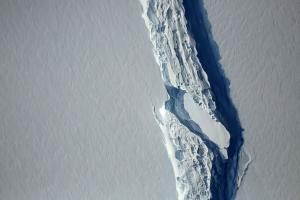June 14 (UPI) — The loss of the Antarctic ice sheet is responsible for 7.6 millimeters of sea level rise since 1992, according to the latest assessment of the polar ice cap.
The Ice Sheet Mass Balance Inter-comparison Exercise, published this week in the journal Nature, offers scientists the most comprehensive and accurate picture of Antarctic ice loss.
According to the latest data, the loss of Antarctic ice is accelerating. As a result, the rate of sea level rise is also increasing. Prior to 2012, the polar ice cap was shedding 76 billion tons of ice per year. Between 2012 and 2017, the ice sheet lost an average of 219 billion tons of ice per year.
“We have long suspected that changes in Earth’s climate will affect the polar ice sheets,” Andrew Shepherd, climate scientist at the University of Leeds, said in a news release. “Thanks to the satellites our space agencies have launched, we can now track their ice losses and global sea level contribution with confidence.”
Scientists were able to produce a more complete picture of Antarctic ice loss by compiling data from a wide array of monitoring efforts.
“The added duration of the observing period, the larger pool of participants, various refinements in our observing capability and an improved ability to assess both inherent and interpretive uncertainties, each contribute to making this the most robust study of ice mass balance of Antarctica to date,” said Erik Ivins, researcher at NASA’s Jet Propulsion Laboratory in California.
Scientists believe the majority of the ice sheet’s mass loss over the last decade can be explained by the melting and retreat of coastal glaciers in West Antarctica and along the Antarctic Peninsula.
Researchers worry that ice loss in Antarctica will continue to accelerate as the structural integrity of coastal glaciers, which helps protect inland ice from warmer ocean water, continues to breakdown.
Ocean warming has caused Pine Island and Thwaites Glaciers to retreat at accelerating rates in Western Antarctica. Meanwhile, the East Antarctic ice sheet remains relatively stable.

COMMENTS
Please let us know if you're having issues with commenting.